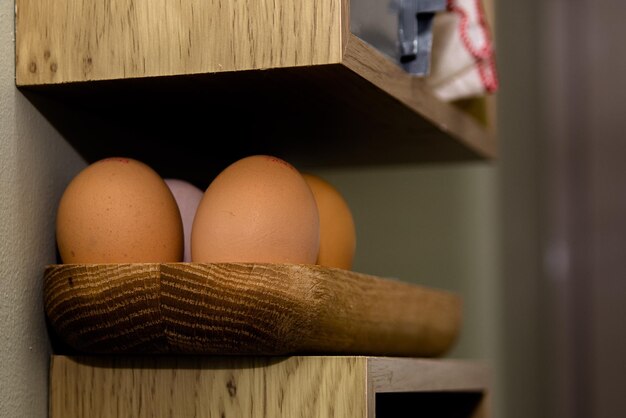Maximizing Freshness: How Long Can You Keep a Boiled Egg in the Refrigerator?
The moment you crack open a perfectly cooked boiled egg, you're opening a world of culinary possibilities. Whether you enjoy them on toast, in salads, or just on their own, boiled eggs are a staple for many. But once boiled, how long can they safely reside in your refrigerator before they must be eaten? Understanding the shelf life of boiled eggs not only ensures safety but also maximizes their taste and texture.
📅 The Essential Timeline: Boiled Eggs in the Fridge
A boiled egg, when stored properly, can last up to one week in the refrigerator. This time frame ensures that the egg remains safe to eat and retains its best quality. However, this guideline can vary slightly depending on several factors, such as the boiling method used and the storage conditions.
H3: Factors Affecting the Shelf Life of Boiled Eggs
- Boiling Method: Whether you prefer soft-boiled or hard-boiled can influence shelf life. Hard-boiled eggs, due to their fully cooked yolks, tend to last longer than their soft-boiled counterparts.
- Storage Conditions: The environment in which you store your boiled eggs plays a critical role. Eggs kept in the cooler parts of the fridge will generally last longer than those stored near the door.
- Eggshell Integrity: A cracked eggshell can open the door to bacteria, shortening the egg’s shelf life. Always handle your eggs with care to avoid unnecessary cracks.
🥚 Understanding Boiled Egg Freshness and Safety
To ensure you're consuming safe and fresh boiled eggs, be mindful of the following indicators:
H3: Signs of Spoiled Boiled Eggs
- Unpleasant Odor: Boiled eggs that have gone bad will typically emit a sulfuric or rotten smell, a clear signal that they’re no longer safe to eat.
- Discoloration: A change in color, such as an odd green or grey yolk, can indicate spoilage. While some discoloration can happen naturally, particularly around the yolk due to iron sulfide formation, use this as a cautionary sign if accompanied by off smells.
Maintaining Egg Safety
- Use a Marker: As soon as you've boiled your eggs, mark the date on the shell. This helps you track their storage time easily.
- Proper Cooling: After boiling, let the eggs cool at room temperature before placing them in the fridge. Rapid temperature changes can cause the shells to crack and affect quality.
📦 Storage Tips for Maximum Freshness
Ensuring your boiled eggs enjoy a long and tasty life in the refrigerator involves following a few straightforward storage principles.
H3: Ideal Storage Practices
Keep Them Shelled: Wherever possible, store boiled eggs with their shells on. The shell serves as a natural barrier against bacteria and prevents moisture loss, maintaining freshness.
Use Airtight Containers: If you’ve peeled your boiled eggs, place them in an airtight container to keep them from drying out or absorbing odors from other foods.
Position in the Fridge: Store eggs in the main body of the refrigerator rather than the door. The temperature is more stable, providing a better environment for your boiled eggs.
Bullet Summary: Key Storage Tips 🥚
- 🚫 Avoid Peel Before Storage: Shell-on for best freshness.
- ⚗️ Airtight for Peeled: When peeled, seal them in a container.
- 🌡️ Center Stage: Keep in the fridge’s interior, not the door.
🥗 Culinary Uses for Boiled Eggs
Boiled eggs are incredibly versatile and can elevate dishes in numerous ways. Below are a few culinary inspirations:
H3: Delicious Dishes Featuring Boiled Eggs
- Classic Egg Salad: Combine chopped boiled eggs with mayo, mustard, and fresh herbs for a creamy, flavorful dish.
- Ramen Toppings: Sliced soft-boiled eggs add richness to a steaming bowl of ramen.
- Nicoise Salad: Hard-boiled eggs are a star component in this French staple, along with tuna, olives, and green beans.
Simple Ways to Incorporate Boiled Eggs
- Toast Toppers: Mash boiled eggs with avocado on toast for a nutritious breakfast.
- Protein Boost: Add chopped boiled eggs to quinoa or green salads for extra protein.
- Snacking: Simply sprinkle with salt and pepper and enjoy!
Culinary Inspiration 💡
- 🥑 Egg-Avocado Toast: Protein and healthy fats unite.
- 🥦 Salad Booster: Adds texture and flavor.
- 🍜 Ramen Perfection: Enhances richness and depth.
🛑 What to Avoid: Common Pitfalls
While boiled eggs are generally simple to store and enjoy, certain practices can lead to a less-than-ideal experience:
H3: Mistakes to Avoid
- Ignoring the Date: Allowing boiled eggs to sit beyond a week can lead to spoilage.
- Mishandling During Boiling: Overcooking can lead to a rubbery texture, while undercooking raises safety concerns.
- Storing Near Odorous Foods: Eggs can absorb strong odors from adjacent foods, altering their flavor.
Avoidance Checklist ⚠️
- 📅 Date Your Eggs: Always mark storage dates.
- ⏰ Perfect Timing: Avoid over/under boiling.
- 🚫 Segregate Odors: Keep away from strong-smelling items.
🌟 Egg-cellent Practices for Long-Lasting Boiled Eggs
With a little attention and care, boiled eggs can be a safe and scrumptious addition to your meals for days. By understanding their lifespan and using proper storage techniques, you ensure they remain as delightful as when they first left the pot.
Whether you're preparing a gourmet meal or a quick snack, knowing how to store boiled eggs effectively is a skill every home cook will find invaluable. Remember these insights and enjoy your eggs with confidence, knowing they’re fresh and safe.

